Our COVID-19 Prevention Impact: 71,160+ People Reached So Far
“Being on the frontlines in preventing the virus is not easy, especially if you are not properly equipped. The fear of exposing yourself to the virus every day is real,” said Catherine Chepkemoi, the leader of 1 of our 4 teams working to prevent the spread of COVID-19 in Kenya.
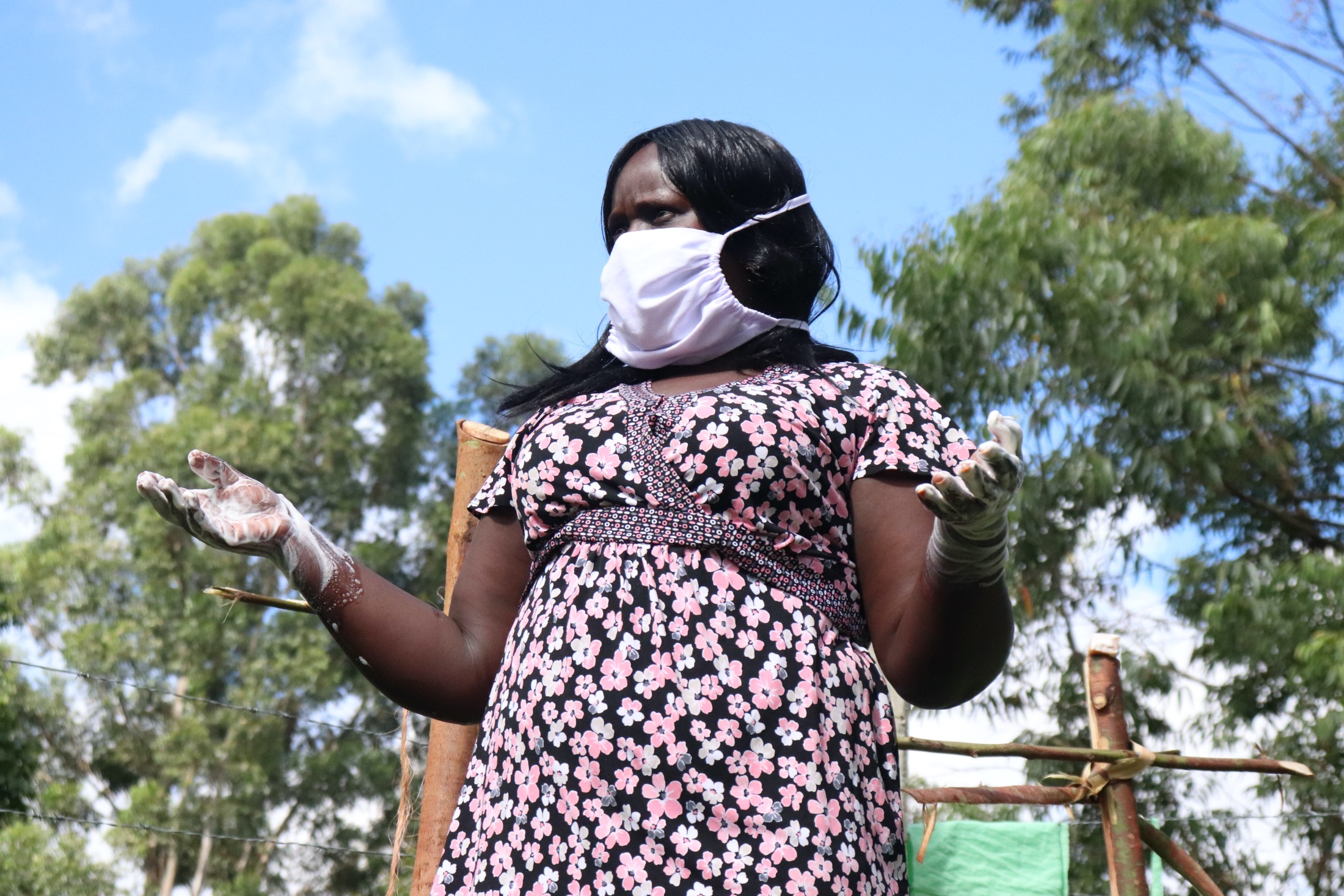
With hands covered in soap mid-demonstration, Catherine Chepkemoi shows the 10 steps of handwashing at Barnes Spring in Ematere Community.
“But the driving force, in this case, is the lives of the people that will be saved through your efforts and sacrifice. It motivates one to wake up to go and fight this pandemic another day. It’s through our combined efforts that we will win the fight against this pandemic.”
As COVID-19 maintains its grip on the world, our global network of WASH experts continues to train every community we serve, wherever possible, on the prevention of the virus.* And that’s no small feat.
To date, we have directly trained more than 14,439 people across Sierra Leone and Kenya. Since we expect most people who attend training to go home and share what they learned with at least family, if not also friends, we can conservatively multiply each country’s totals by their average household size (6 and 4, respectively), resulting in an estimated 71,160 people reached! Our teams on the ground think that number is closer to 75,000 based on the information sharing they witness every day.
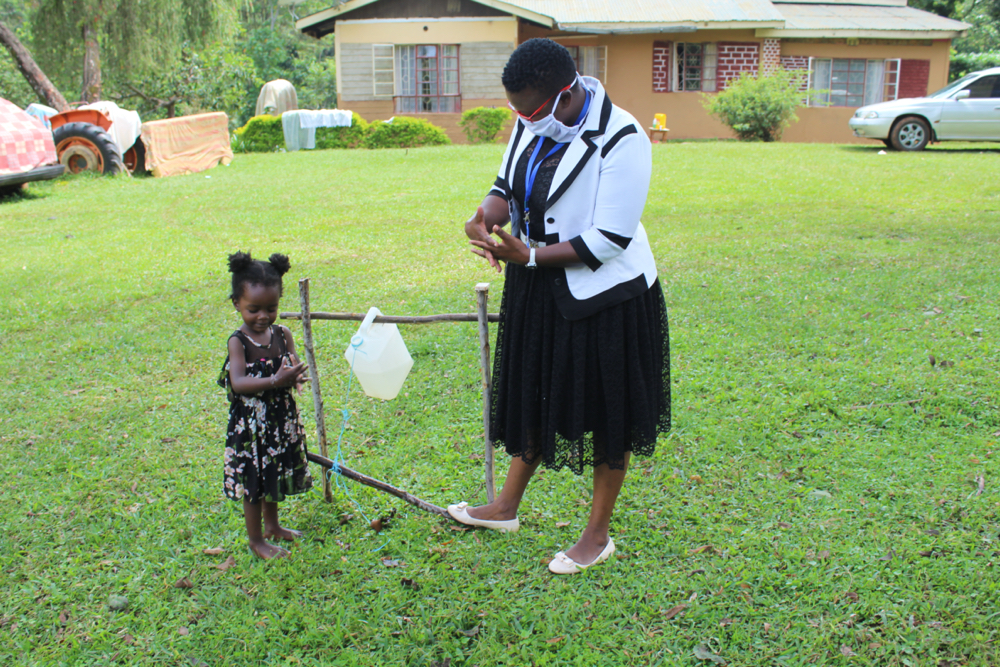
Trainer Jacky Chelagat walks through the 10 steps of handwashing using a tippy tap with a young girl at Shihachi Spring in Lutonyi Community.
In Kenya alone, our 4 regional teams have trained more than 8,300 people, with our 3 Western Kenya teams accounting for more than 83% of those reached in Kenya and 48% reached by our network worldwide. We recently asked the directors of each of these Western Kenya teams – Catherine Chepkemoi, Emmah Nambuye, and Humphrey Buradi Zadock – to share what it has been like leading the charge in COVID-19 prevention in their homes.
Since the Western Kenya joint-team began their COVID-19 sensitization and prevention trainings back in March, a lot has changed both locally and globally. In Kenya, confirmed COVID-19 cases are on the rise, with current tallies over 28,700. Kenyans have weathered several cycles of lockdowns, curfews, and restrictions, along with significant economic impacts. More than 1 million Kenyans have lost their jobs since the start of the pandemic, with some estimates more than tripling that number.
Through all of this, water has played and continues to play a critical role in COVID-19 prevention best practices. Handwashing, cleaning surfaces, and washing dishes all require clean water to be effective. This is why the Kenyan government granted our Western Kenya teams “Essential Services Status” early on in the pandemic. This classification ensured that our teams of health and hygiene trainers could continue traveling to communities to keep their water running and bring accurate information about COVID-19 transmission routes, symptoms, and prevention to their doorsteps.
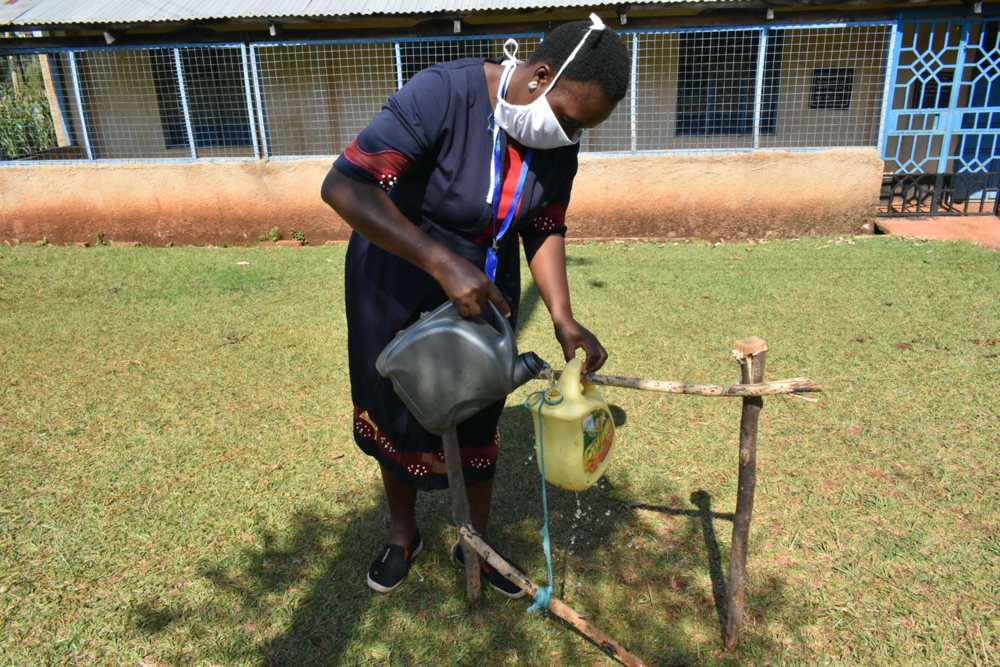
Trainer Karen Maruti fills a tippy tap handwashing station built during the training in Wamuhila Community with clean water from Isabwa Spring.
“We have a responsibility to join the government in fighting this pandemic because we all have a common goal,” said Catherine, who has been juggling work with caring for her 2 young daughters, Precious and Kayla, now at home due to coronavirus-related national school closures.
“Almost all of the communities we visited for sensitization trainings confirmed that we were the only organization who went there and took time to train them on COVID-19, and they really appreciated the gesture. This clearly shows that the Ministry of Health may not be having the capacity to conduct trainings in every community. Therefore, we have a role to play in complementing the efforts of the government in fighting this pandemic.”
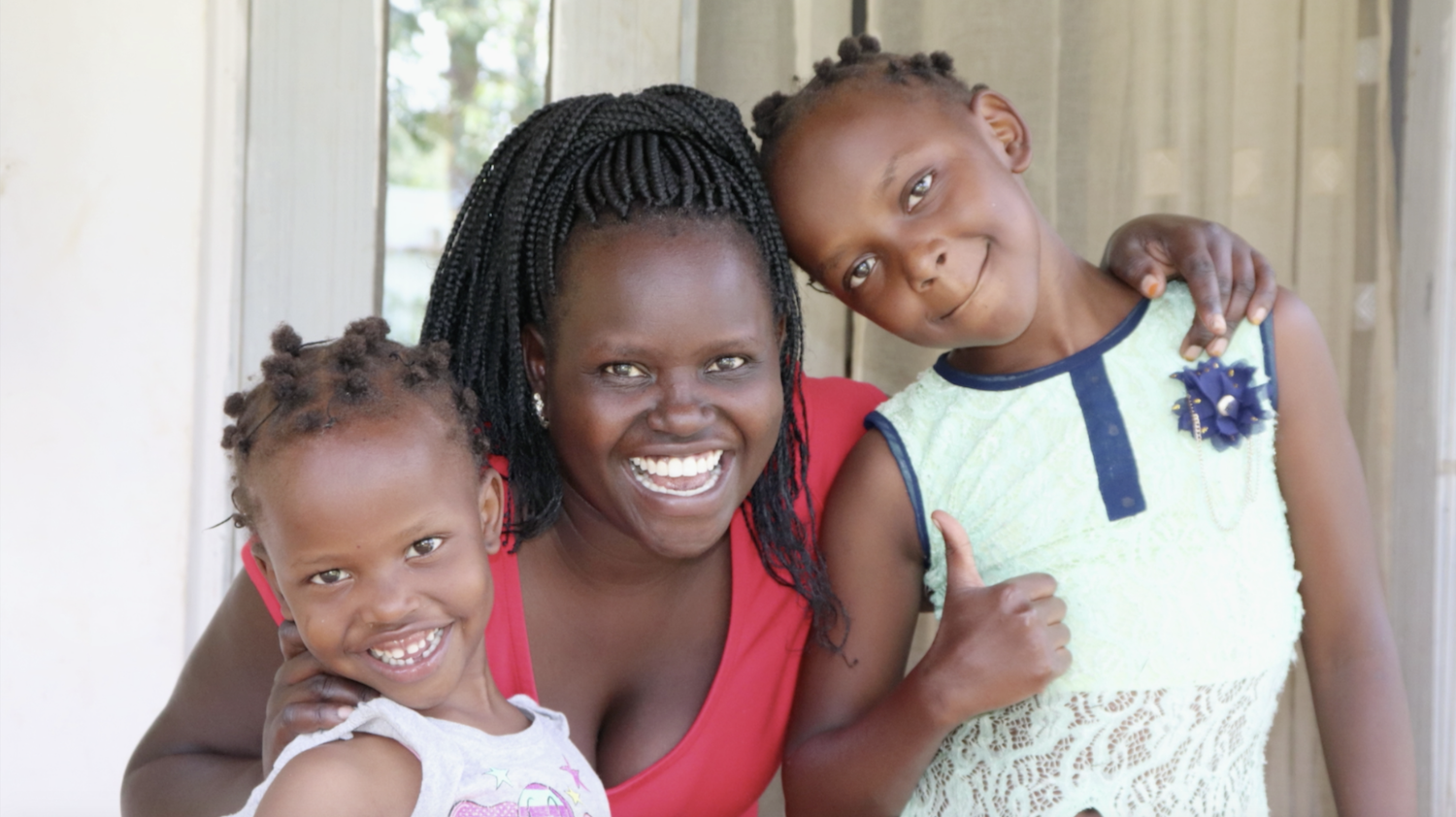
Catherine at home with her daughters, Kayla and Precious.
“We feel honored as part of the national effort to respond to this pandemic. Looking at the numbers we have reached out to in Kakamega County within the [last] 4 months, we attribute this effort to the low numbers of COVID-19 cases in Kakamega,” added Humphrey. For him, fighting this virus is central to his family’s daily life as his wife, Janet Kayi, and 1 of their 4 daughters, Christine Luvandwa Kayi, both work training communities under Catherine’s leadership.
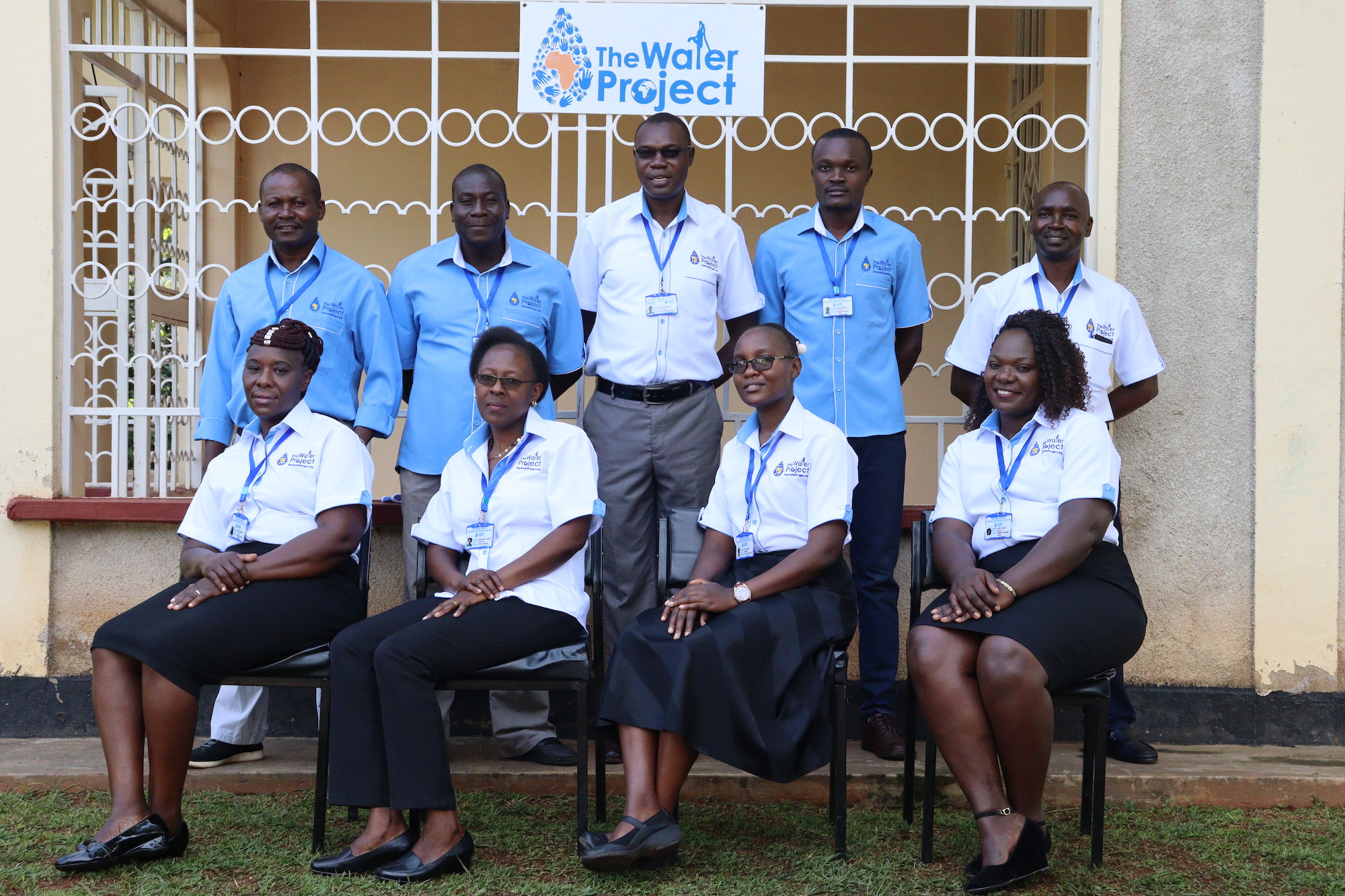
Regional Director Humphrey Buradi Zadock (standing in center) with his staff outside their office wearing their government-issued ID’s to prove their Essential Service Status at travel checkpoints. Clockwise from top left: Justus Mukonyole, Stanley Makwata, Humphrey Buradi Zadock, Isaiah Shihuli Andoyi, William Muruli, Fanice Terry, Joan Were, Margaret Akinyi, and Susan Kamole.
“Information is power,” Emmah said, “and most people suffer because they do not have access to reliable information…We have managed to contain the spread of the virus through the sensitization trainings which we have conducted and which have seen us go back after the community requests that some [people] were not there during the first training.”
Emmah’s work to prevent COVID-19, like so many of her colleagues, does not stop when she gets home. She has to be vigilant of her own and her family’s hygiene, taking every precaution to make sure her young daughter, Naomi, and son Julius stay healthy. Her other son, Isaac, was for a long time stuck in a different sub-county due to the local lockdowns and travel restrictions. He, too, is expected to come home soon.
Reflecting on each topic covered in training, Emmah, Humphrey, and Catherine noted there have been similarities in how communities respond to the training. Many people already had some knowledge of common COVID-19 symptoms and transmission routes. They had also heard about the importance of handwashing and social distancing, and people were particularly interested in the sew-your-own-mask tutorial facilitators led.
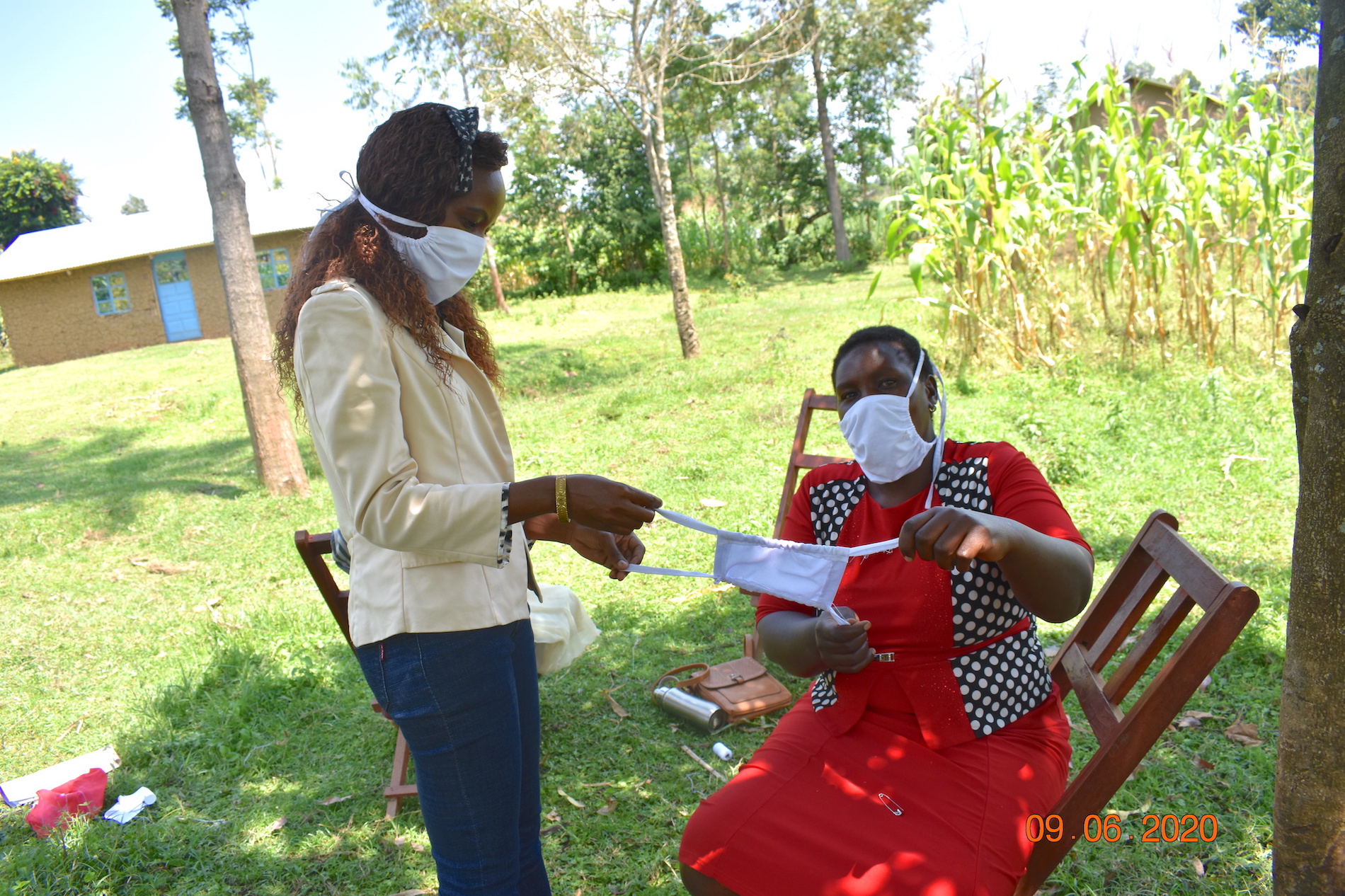
Trainer Betty Mwangi and Team Leader Emmah Nambuye (seated) show a mask they sewed at the training for Ataku Community, Ngache Spring.
“They were surprised at how easy it was to make the face masks using locally available materials,” reflected Catherine. “After the training, every participant went and started to make [masks] for their families and also teach those who did not get the chance to attend the training.”
“It eased their concerns of how they would afford masks for their families throughout the pandemic,” Humphrey added.
The team agreed that some prevention measures present particular challenges to communities, despite community members’ best intentions to stay safe.
Social distancing can be hard to enforce, especially among children who have been out of school since March. Not attending highly community-focused cultural activities, such as weddings and funerals, is socially and emotionally difficult. The absence of daily conversation with neighbors at the water point leaves people feeling alone and isolated. And everyone is prone to slip up on their handwashing routine or mask-wearing from time to time.
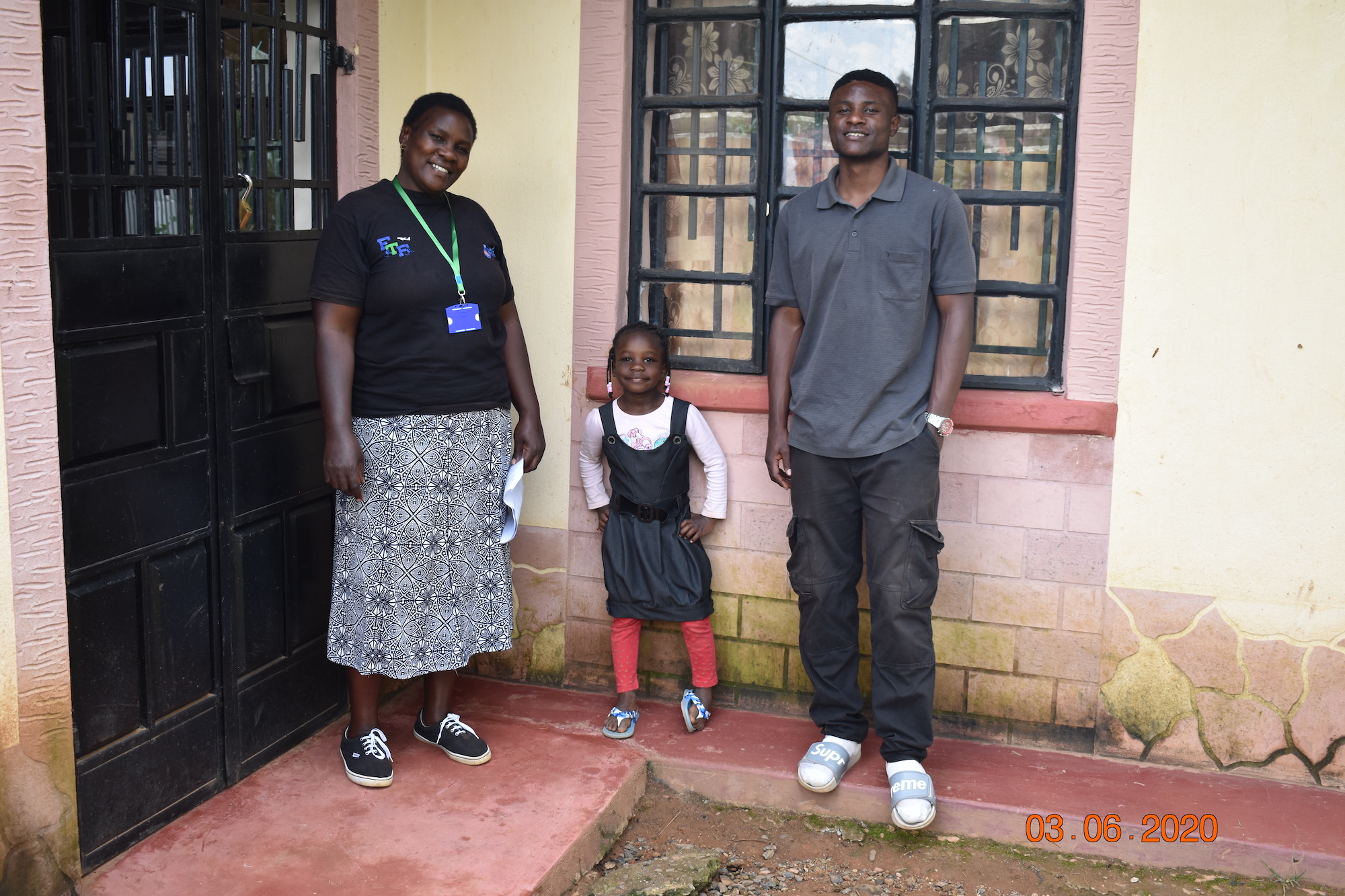
Emmah at home with her daughter Naomi and son Julius.
“Keeping social distance has been a challenge to many people, especially in shopping centers. The social nature of human beings has always pushed them to break social barriers…Adapting to this new normal is also cumbersome in families where people have to share many things within a much-squeezed space, within 1 house or room hosting so many people,” said Catherine.
But the changes are not all negative.
“The most significant change that I have observed is the installation of handwashing stations all over the communities. Even street vegetable vendors and maize roasters have leaky tins and soap next to their stalls,” Humphrey reported.
“There are more farming activities as a way of keeping busy,” Emmah said, and home hygiene and sanitation levels have improved.
“Since we started conducting COVID-19 trainings, we have observed a positive trend in people washing their hands using water and soap…People really take and practice proper handwashing more seriously than before, as they believe that it is the number 1 way to prevent the spread of COVID-19.”
“Most of the households have taken the initiative to install their tippy-taps at the home level for the use of their family members and whoever would come visiting. These handwashing stations are generously supplied with clean water and handwashing soap. This has, in turn, helped in lowering cases of diarrheal diseases being reported by the rural residences compared to the pre-COVID period.”
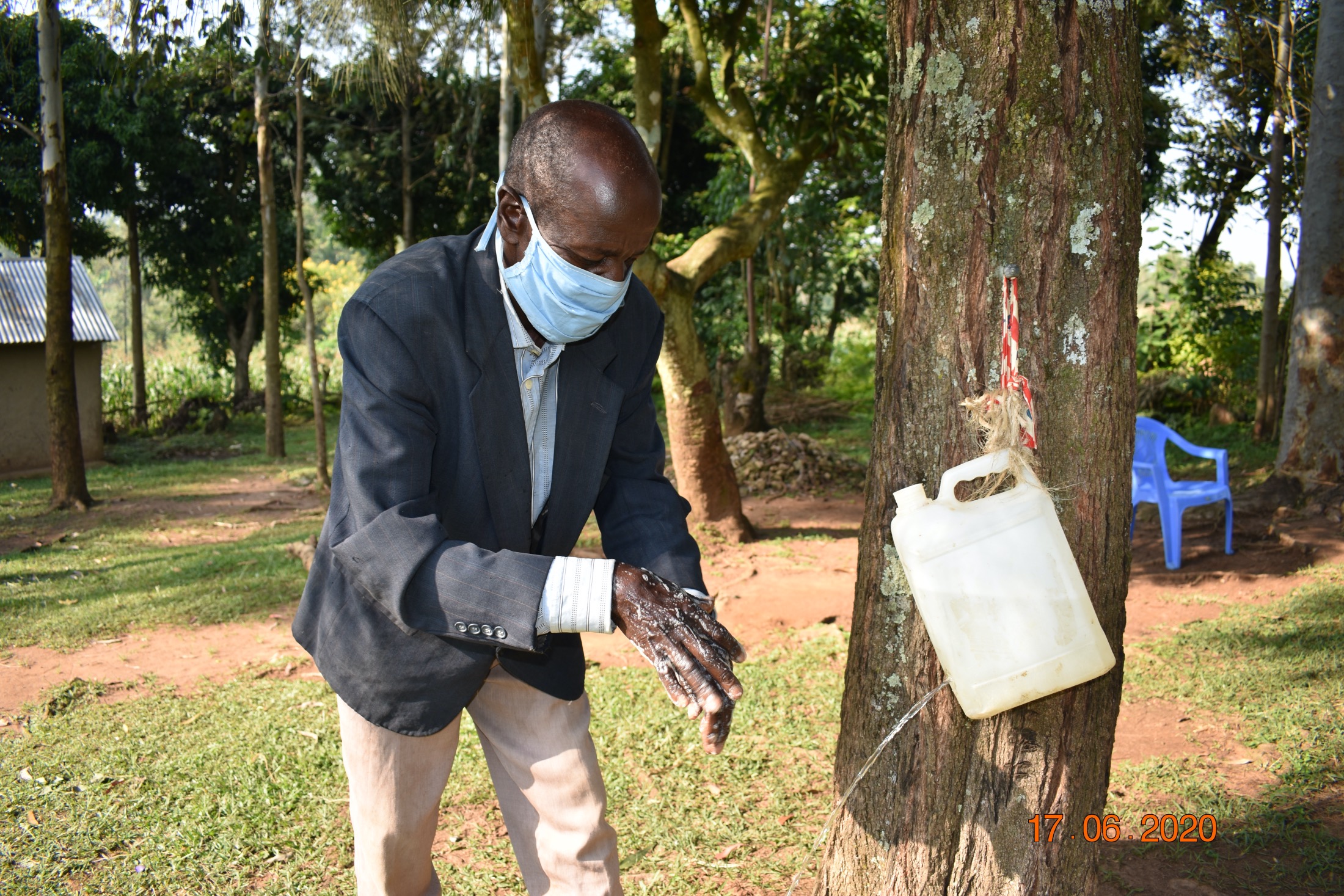
David Kweyu of Eshiakhulo Community washes his hands with soap and clean water from Kweyu Spring using the leaky tin handwashing station he set up outside his house at the advice of trainers from Emmah’s team.
One of the key differences between our teams and the other information sources on COVID-19, such as the radio or television, is the personal connection, mutual respect, and trust they bring to their partner communities.
“The most important thing that our team has brought to the communities is hope. We always visit and keep in touch by sensitizing them on the symptoms and prevention against contracting COVID-19. They are very appreciative that we have taken time to engage with them on a more personal level whereby they get to ask questions about COVD-19, and we are able to share [answers] from the resources we have,” said Emmah.
“Most communities that we visited…did not have any further information on what to do in case a family member falls ill. Most of them are in the dark on testing procedures and find it hard to understand terminologies used in the information given about coronavirus. Some do not even know the meaning of COVID- 19,” recalled Humphrey. “Therefore, our team is able to give factual information in a simplified manner. Most communities access information on the coronavirus through the radio, which does not provide the advantage of visual learning.”
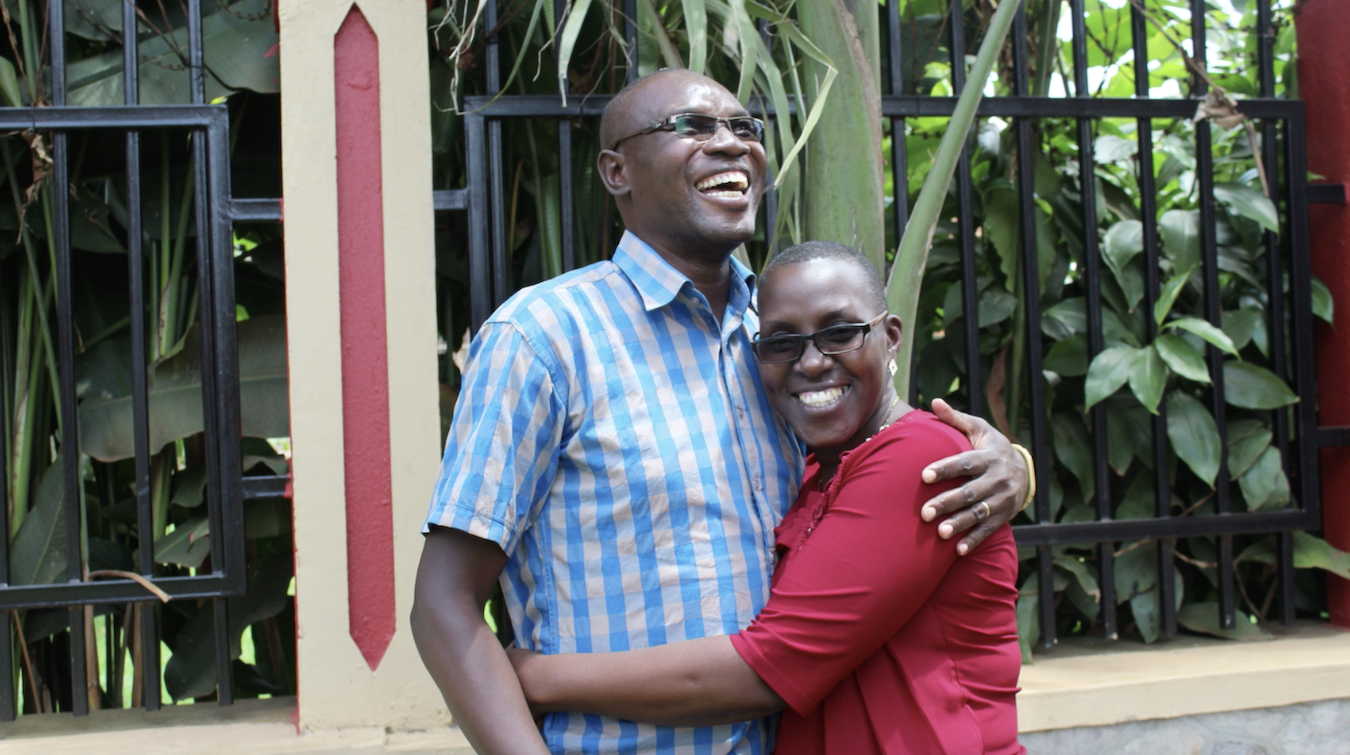
Humphrey enjoying a light a moment at home with his wife, Janet Kayi.
“Additionally,” Catherine noted, it also created an opportunity for the trainers to teach trainees and show them practically how to improvise and use handwashing facilities without touching the containers as a way of preventing the spread of COVID-19.”
“Finally, going to meet, discuss, and involve [community members] with love in everything and share [this information] freely gave them ownership of prevention techniques that are suitable to them, giving them hope that it is possible to prevent this disease,” she added encouragingly.
With so many trainings completed in just 4 months, the Western Kenya team remains an inspirational model of positivity, love for the people they serve, and a determination to “Kick Corona out of Kenya,” at once a mandate and message of hope they have been passing to the communities they serve along the way.
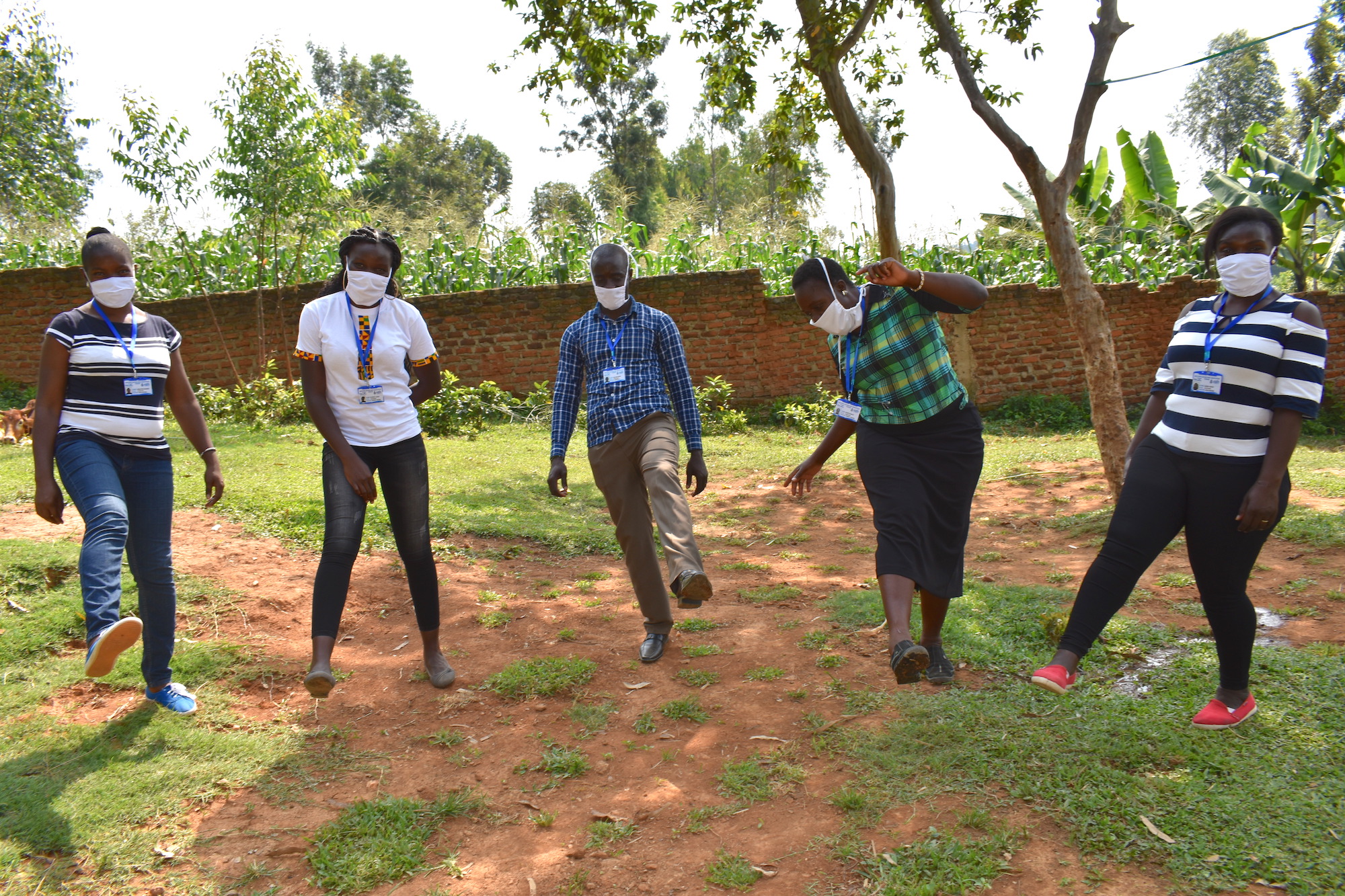
Trainers are vital in helping to “Kick Corona out of Kenya!” From left to right: Christine Nafuna Masinde, Patricia Aluso, Erick Wagacka, Karen Maruti, and Laura Alulu.
So how do they keep their teams energized? Teamwork, mostly. Snacks help too.
“Staying home can be both stressful and tiring, especially to someone who is used to actively engaging themselves in fieldwork activity. The daily rising of new cases of COVID-19 infections and deaths in our country and globally also makes the situation worse,” shared Catherine.
“But at the end of the day, life has to continue. As an organization, we have 2 WhatsApp pages – one that is purely work-related, and the other one welfare related. The 2 platforms are a powerful tool for communication. On the welfare page…a specific theme for the day with the hope of spiritual uplifting and motivation [is shared daily]. Here, any individual can request prayers and share motivational texts, videos, and songs. They can also share what is going on in their lives.”
“On the work-related page, we share plans and schedules for work. Here, tasks can be assigned, and reports requested or shared. In efforts to enhance staff safety, they are only allowed to go to the field using organization vehicles and adhere to the safety measures put in place when meeting with community members. This allows our staff to break the monotony of staying home and feeling alone.”
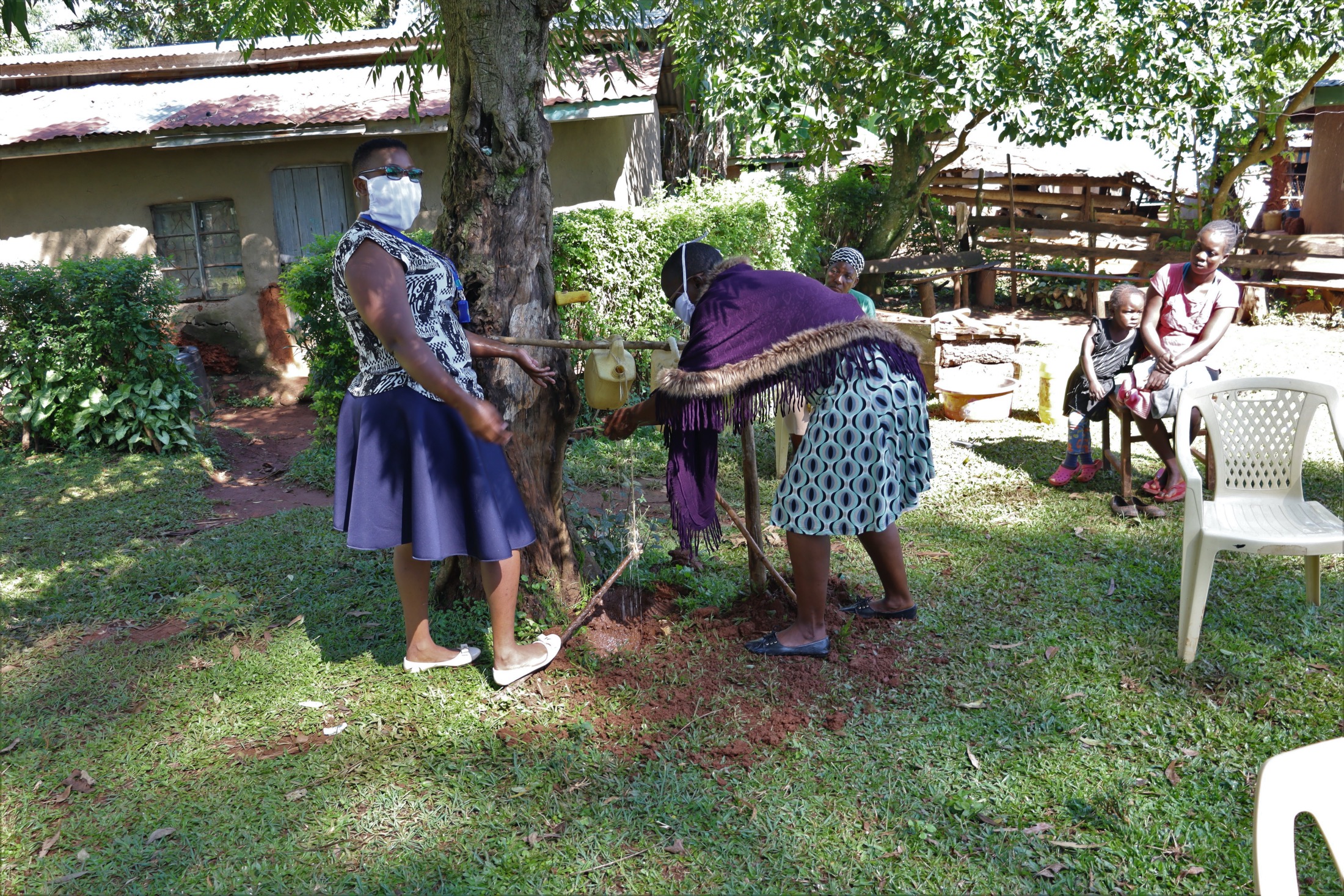
Trainers Jacky Chelagat and Janet Kayi use teamwork to operate a tippy tap handwashing station at a training in Shilakaya. Facing long days together in small pods, the staff depend on each other for professional as much as personal support.
Emmah’s team has also adopted a new schedule specifically focused on balancing work with recovery time for staff.
“We have reorganized ourselves to interact with each program area around COVID-19 and having a scheduled plan where staff alternate for specified activities for different days so that we have rests as we move along. This is to ensure that everyone is energized well when carrying out their duties. We also ensure that we finish our work by mid-day so that we get back to our families early enough.”
As for Humphrey’s staff, “We keep the team energized by sharing the tasks among ourselves on a weekly basis. This would enable team members to plan adequately on how to have the task undertaken without straining. We would also carry snacks and water to the field so that the staff would refresh whenever their sugar levels would drop. Back at the office, the hospitality colleague would serve the staff from the field with a hot plate of food and a beverage. This is something that has kept the team intact and energized.”
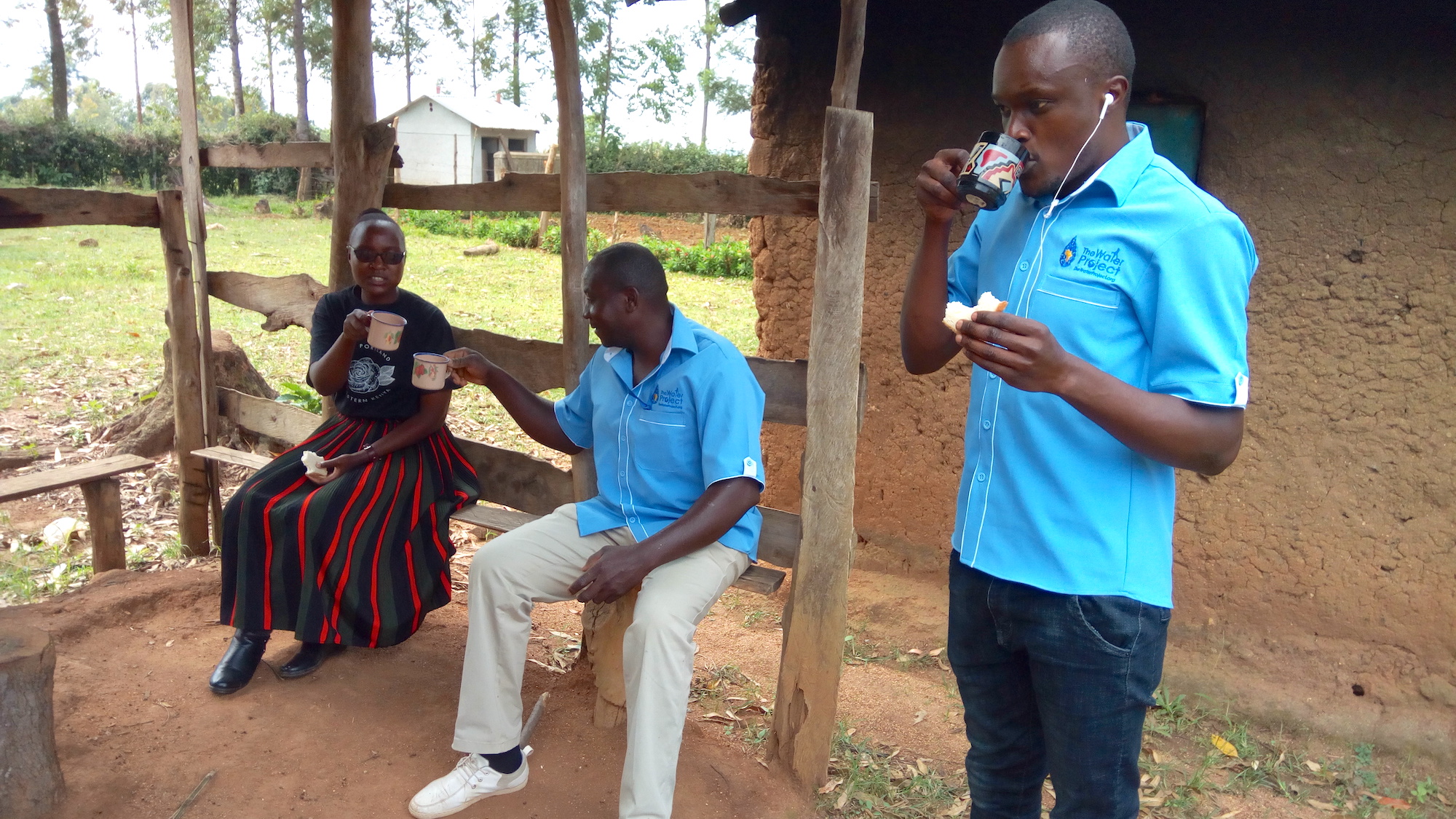
Joan Were, Stanley Makwata, and Isaiah Shihuli Andoyi enjoy a secluded snack break during a busy day of trainings.
Catherine, Emmah, and Humphrey all expressed immense pride and gratitude for their teams. Without them, the COVID-19 prevention trainings and messages of hope may have never reached the rural communities they serve. Some staff have completely shifted their daily work, bringing all hands on deck to community outreach and training. The days are long, training topics repetitive, and the conclusion is not yet in sight. But through it all, the teams stay strong.
“I have seen the uniqueness of each staff member and the positive energy they have brought in the sensitization trainings in the communities. All of us focused on one thing: to protect ourselves and take the message to the communities so that they, too, will be safe…The effort put in by my team makes me know how much they love what they are doing, and this makes me so proud and fulfilled. I feel proud of my team because they do not only work to provide clean and safe water to the community, but also to ensure that the communities they work with are safe and healthy,” said Emmah.
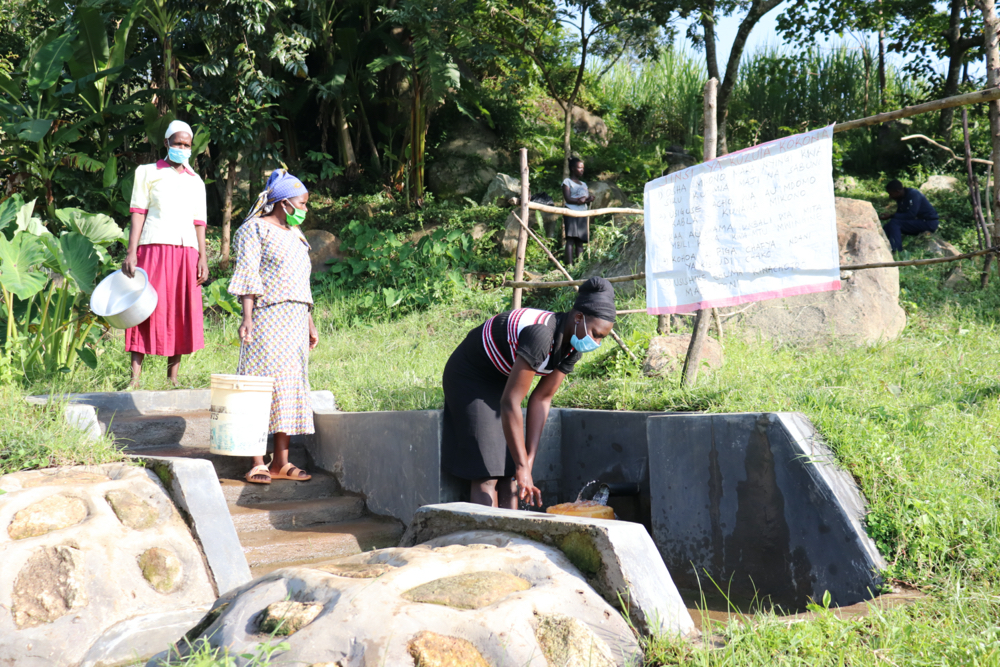
Community members from Mahira observe social distancing and wear masks while fetching water at Kusimba Spring. The COVID-19 prevention reminders chart installed by Catherine’s team during their first training there hangs on the spring’s fence.
“Putting the lives of the community members first before their own is humbling,” reflected Catherine. “The teamwork and the team spirit in this team is awesome. They work with passion, commitment, dedication, and professionalism. They execute their tasks so well, and sometimes they go beyond expectations to achieve the targets on time. They work with very minimal supervision once the schedules are shared…They are also prayerful, loving, and caring to one another.”
Fighting this global pandemic is a Herculean task far from over, and one that would not be possible without these amazing leaders and their dedicated teams. Our gratitude for their service, now and every day, runs deep.
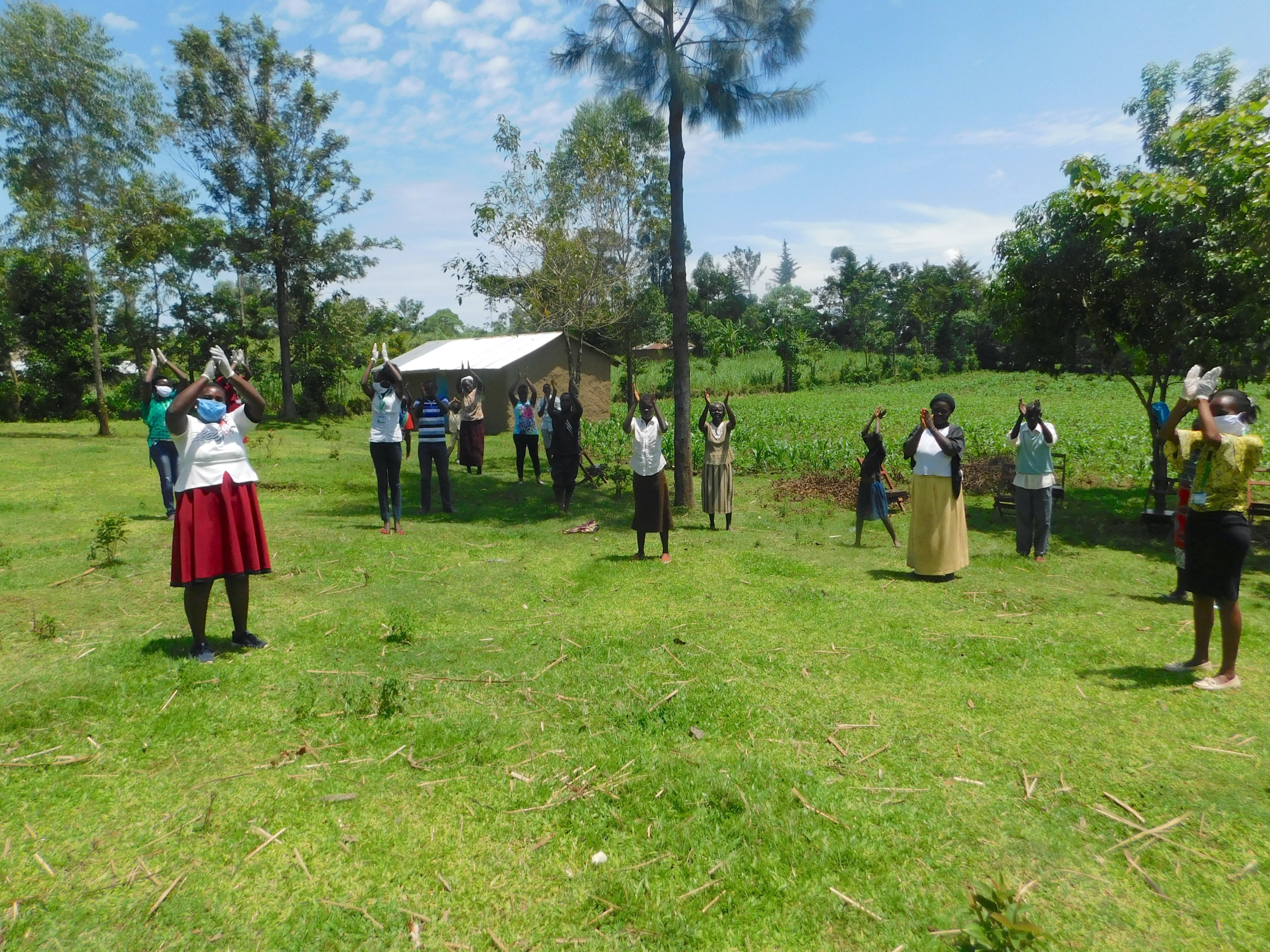
Emmah (left), along with her team and community members from Ataku, give a round of applause for their efforts and the efforts of everyone worldwide working to end the COVID-19 pandemic.
*Though we also work in Uganda, current preventative measures there prohibit our team’s movement to conduct trainings.
Interview questions written in collaboration with Tom Murphy.
Home More Like ThisTweet